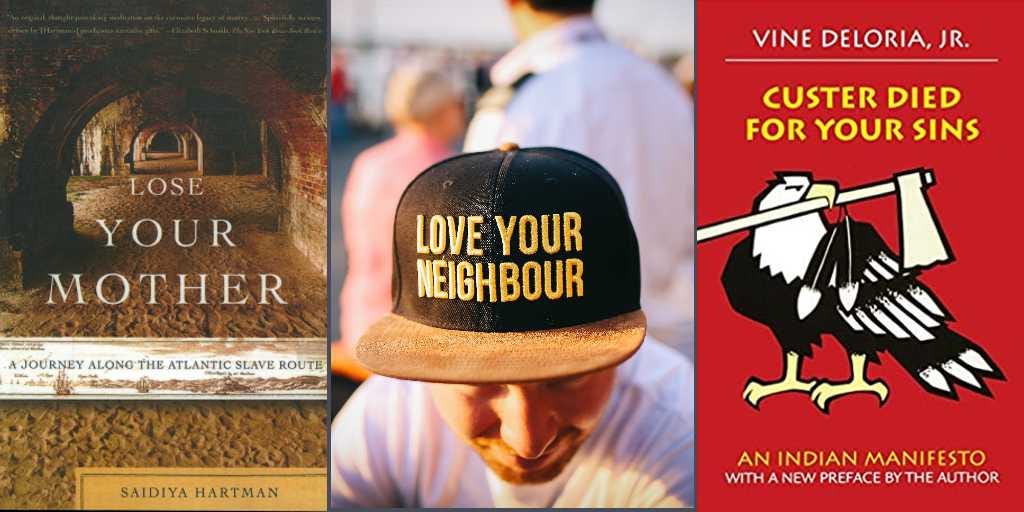It is not permissible that the authors of devastation should also be innocent. It is the innocence which constitutes the crime. James Baldwin. Quoted by Saidiya Hartman in Lose Your Mother.
It is not permissible that the authors of devastation should also be innocent.
Not permissible.
Not.
It is the innocence. Their innocence. The innocence they are born into which constitutes the crime.
And what are we born into. Those of us who are born on reservations and in cities. Those of us who are born of ancestors that did not choose this continent. Those of us who are born of the ones who fled in the night stumbling into a freedom that was promised but is forever out of reach. What are we born into. Not innocence that’s for sure.
They get to say that they didn’t know. That nobody told them. At most they hear of it in passing while reading fiction. Studying history that might as well be fiction. Pictures of happy slaves and Indians sharing a feast with behatted pilgrims. Their innocence is the crime but it is our people who fill the jails.

Lose Your Mother is a heartbreaking search for home. According to my notebook I read it just before Custer Died For Your Sins, and so it is the notes that I took on both of these books that I will juxtapose. The innocence and the guilt and who bears the consequences of these things.
Vine Deloria Jr, the author of CDFYS and many other books, comments on the way that Black people and Indians are treated differently by the state. The systematic and aggressive exclusion of Black people from everything but prison and while simultaneously working to assimilate Indians and that’s the party line isn’t it. The different ways that we were treated and then our different reactions: Civil Rights seeking the inclusion they were denied while Indians just want to be left alone. But I don’t buy it anymore, for a lot of reasons and I know it takes balls to disagree with Vine Deloria Jr, but I disagree with him about the ancient aliens in God is Red too.
What are reservations if not the very definition of systematic and violent exclusion? Relocated again and again we too are forced to make home in the place that settler colonial power chose for us. Expanding and contracting, mostly contracting, our lands as suited them. And yes, many of us sought the inclusion we were denied. We went to cities and found jobs. We went to prison and found community. Black people too just want to be left alone. And like Saidiya Hartman, those of us who grew up in urban spaces try to go home only to find that we’ve lost our mother.
Losing your mother is a West African turn of phrase and it refers to loss of identity, language, country. She writes about her assumption that the Black world shared a common thread, some common memory or connection because of their race only to find that being Black in Ghana is not the same as being Black in America and that many of those whose jobs rely on western tourism resent the tears of rich Black Americans (for who else can afford this trip) who cry about being descended from slaves while those who stayed behind remain in poverty.
And I feel this too. We who grew up in urban spaces, in homes free from mildew with water we can drink right out of the tap, and half a dozen grocery stores to choose from. We go home, sometimes taking long trips that cost a fortune in gas or airfare, and cry about our losses to those who live in overcrowded, underheated homes in places where food costs two or three times as much.
At the end of the book she does find community and welcome, she finds mother Africa and her place in it. And we too, scooped and scattered, find home. We start to build relationships and we learn to understand the losses that each side has felt. Those who stayed behind and those who were taken away stop idealizing the life we did not have and see the losses. We who were born into loss and grief, who will forever be outside no matter how hard we may try to be included, we find peace with that and we find each other.
Near the end of Custer, Vine Deloria comments that for native people, unity is the kind of fellowship that churches talk about, that white people sell in clubs and social groups … it is a common humanity, not a pressure group of conquest. And I agree with him on this but only because Black people are native too and so in my mind he’s talking about all of us. Because we all want to be left alone and the inclusion that we do seek mostly has to do with jobs and access to the social services and keep body and soul together. But we want our land back so we can be left alone on it and the descendants of enslaved Africans should have plantation land back, we can give them that much can’t we? We were willing to give land to white people when they first arrived.
Our unity is formed from the communities we live in. Not a weekly gathering based on a shared belief but the warp and weft and our lives. Our shared losses and common goals. The conquest that acted to exclude us so violently. It worked. You kept us out and now we’ve found community with each other and what do you have.
Innocence?
what a crime.
Losing our mothers
on race and belonging and going home
